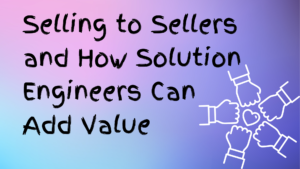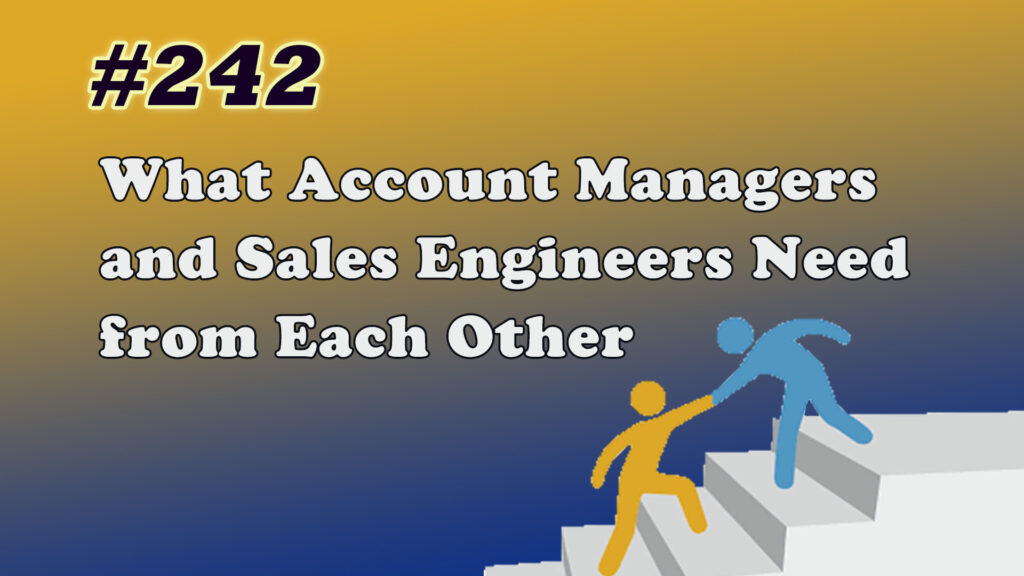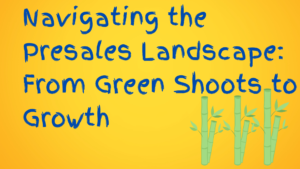
Blog
Notes:
What is the key to a great sales team? Should the salesperson be talking to the customers all the time, or should the sales engineer be able to say their piece? In this week’s episode, we talk to a great Sales Engineer and a great sales trainer and consultant for companies around the world. If you’re interested in building a great partnership with your sales or SE counterpart, then definitely keep on listening!
Michael Griego is a world-class sales trainer and sales effectiveness management consultant based in California. In the last 20 years, he’s founded MXL Partners a Silicon Valley-based sales effectiveness consulting and training firm. He’s conducted sales management consulting for companies around the world and has led sales training for thousands of salespeople in companies ranging from Silicon Valley startups to Fortune 500 firms. His books are 42 Rules to Increase Sales Effectiveness and No Excuses! A Better Way to Sell.
David McCulley is the Senior Vice President of Sales Engineering at Provarity, a full lifecycle and continuous Proof-of-Value platform that provides enterprise sales and purchase stakeholders with real-time visibility, seamless collaboration, and AI-powered insights. Provarity’s platform combines intelligent services for workflow management and collaboration and success monitoring to transform how businesses, partners, and customers manage the enterprise customer lifecycle.
Key Takeaways:
- What makes a good salesperson and how to know if you hired the right person for your team
- Tests you can give prospects to assess their competency and potential to be a salesperson
- Qualities both Mike and Dave are looking for in a good sales engineer
- How to work with a brand-new SE and unleash their strengths
- The kind of training or support an SE needs to actually be a partner to their sales counterpart
- What do you do if someone’s not advancing at a level that you expect?
- How to help the customer make a decision without public humiliation?
- What is the role of an SE in a discovery?
- The pre-work both SE and AE should be doing before going on calls with customers
- Mike and Dave recall experiences when an SE did something that drove them nuts
- The importance of pausing the demo to give the customer an opening to ask questions
- Why having a good fair and gracious conversation with people is so crucial
Quotes:
“How they perform is not about being a superstar athlete. But you look at school performance or academic performance, or if they’ve been in the sales world for several years, you can actually be really clear and deliberate on what their performance records and stack rankings have been. So, people that have been continuously successful, that tells you something about their ability to adapt to a situation and continue to rise to the top. – Michael Griego
“At the high level, at the global level, I’m looking for individuals that are likable and good teammates, folks that can both relate with their selling partners, can relate with me as a leader, and can relate with my customers… I like soft skills. So I need to know they have those soft skills, those teaming skills, and those likability skills. – David McCulley
“There’s nothing better than finding an SE that has what I call a sales orientation. They understand what their role is and what we’re trying to do. And as we’re trying to move a deal forward, we’re trying to get a deal done and get it done. So they have a tendency to want to lock up that sync with the salesperson as a team to advance the ball downfield, as opposed to an SE that may be very, very good and competent with excellent domain expertise, and technical skills, however, they can’t see past the technology. And therefore they might have something missing in the conversation with the customer. And they miss some communication cues or some dynamics in a conversation. And so that’s why I say it’s a sales orientation.” – Michael Griego
“I tell my SEs that have been in my organization, you need to know your business like a rep knows your business, you need to know what accounts are in your pipeline, what deals you’re working on, and how you’re making your money. You need to be a little bit financially driven, and you need to be one willing to compete.” – David McCulley
“It’s very much like a marriage. I think you got to get to know each other, get along and have a plan for moving things downfield in a way that works. So it’s a very collaborative effort.” – Michael Griego
“We like to help customers, but sometimes helping the customers is just shutting up and helping them make a decision versus solving all their problems today.” – Ramzi Marjaba
“As I started to kind of understand this that when Debbie says something, I have an answer right away. When a customer says something, as a rep I have something to say right away. What I learned is, I need to hold back. And I need to ask questions to probe into well, what’s behind that comment. And when you do that in sales, you end up with better discovery conversation, you do that in a marriage, you end up with a better relationship with a long term marriage, and better kids come out of it, too.” – Michael Griego
Links from the show:
- No Excuses! A Better Way to Sell by Michael Griego
- 42 Rules to Increase Sales Effectiveness: A Practical Guidebook for Sales Reps, Sales Managers and Anyone Looking to Improve their Selling Skills by Michael Griego
- The Six Habits of Highly Effective Sales Engineers by Chris White
- Crucial Conversations: Tools for Talking When Stakes Are High by Joseph Grenny, Ron McMillan, Al Switzler
- Connect with Michael Griego on LinkedIn
- Connect with David McCulley on LinkedIn



